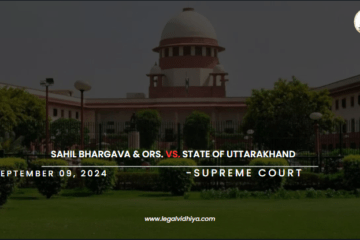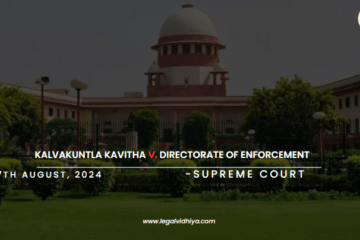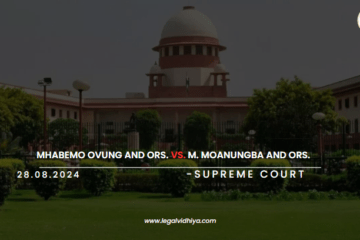![Sachin Kumar Vs. Delhi Subordinate Service Selection Board (DSSSB) [March 03, 2021]](https://legalvidhiya.com/wp-content/uploads/2024/09/Screenshot-2024-09-27-192350.png)
| CITATION | 2021 SC 128 |
| DATE OF JUDGMENT | March 03, 2021 |
| COURT | Supreme Court of India |
| APPELLANT | Sachin Kumar |
| RESPONDENT | Delhi Subordinate Service Selection Board (DSSSB) |
| BENCH | D.Y. Chandrachud, M. R. Shah |
Introduction
The Supreme Court of India observed in the significant legal review of the case Sachin Kumar & Ors. v. Delhi Subordinate Service Selection Board (DSSSB) & Ors. The matter under consideration was the legality of the Tier-I and Tier-II examinations, which took place in 2009, the Head Clerk recruitment that was done by DSSSB.
The catchword in this case was whether there was any justification behind the cancellation of these examinations, which were initially held for the purpose of recruitment to the post of Head Clerk. This has arisen consequent upon the confirmation of the decision of the Central Administrative Tribunal in respect of the cancellation of the exams by the Delhi High Court.
The Supreme Court had to determine whether the rulings of the lower courts could try whether to set aside inadequate regarding the irregularities the reported in the examination process. This centered on ensuring related to the review were guaranteed once the principles of natural justice and legality prevailed in trying the examination matter
The implications, therefore, of such a case are broader beyond the sustenance of integrity in the recruitment processes. How far can a court go to ensure that fairness is reached.
This case mirrors judicial scrutiny over administrative decisions, especially on matters of public recruitment and against infringement of the rights of the candidates flowing from the constitutional provisions.
Facts
A requisition for filling up various posts, including that of the Head Clerk, was sent by DSSSB to the Secretary, Department of Personnel and Training, New Delhi with a request to fill up the said posts through direct recruitment. An advertisement to that effect was issued by DSSSB on 26.12.2009. The recruitment was proposed to be made in two stages, namely, preliminary examination and main examination.
The Tier-I test was essentially an objective examination of 200 marks and 2.5 hours’ duration, meant to serve the purpose of shortlisting candidates for the purely descriptive Tier-II examination, which was also of 200 marks and 2.5 hours’ duration.
During the period from October 14, 2014, to March 27, 2015, DSSSB received several complaints of grave irregularities in the manner in which both the tiers of the test were conducted, such as leak of question papers, mass copying, and impersonation.
A probe committee, with the Director, Vigilance, and the District Magistrate, East Delhi, was constituted on August 22, 2015, to look into the allegations. The inquiry by the committee unearthed shocking irregularities, which have scarred the examination process.
Upon the findings of the committee, the Deputy Chief Minister of Delhi made a recommendation to cancel the examinations. Subsequent to this, on 15th March, 2016, DSSSB issued a notification, cancelling the entire recruitment process. This gave rise to multiple writ petitions by numerous candidates who considered themselves aggrieved by the order of cancellation.
Issues
- whether the decision of the High Court to uphold the decision of the Tribunal was the correct one?
- whether the appeals of DSSSB and the Delhi Government were in order?
- whether the cancellation notification had enough reasons?
- whether the act on the part of DSSSB to cancel the examinations was legally tenable in the light of the proven irregularities?
Appellant’s submissions
The appellants also argued that, based on the essence of it, the decision by the Tribunal to set aside the cancellation was one not only fair but necessary because successful candidates should not be prejudiced by the cancellation, but rather proceed as initially planned.
It was their submisiont that the cancellation of the results should be restricted to the ones established to have been implicated in the irregularity irregularities whereas the process of the rest is left unaffected. Their argument was a safeguard against the inflicting of injustice on the candidates whose results had not been tainted by the irregularity.
It was further contended by the appellants that DSSSB’s recommendation did not indicate systemic defects in the recruitment process as such, and in that view of the matter, the irregularities were localized and could have been addressed properly without scrapping the entire process.
They submitted that the concepts of fairness and equality mandating under Article 16 of the Constitution conferred all opportunities on all the candidates, and the scrapping disproportionately affected the candidates who have not played any mischief.
The argument went on further to make sure that the relief provided by the Tribunal should benefit all candidates found free of taint, thus an equitable and just resolution of the recruitment process;
Arguments for Respondent
The respondent represented by DSSSB argued that the whole recruitment process was vitiated by fraud which made it impossible to sift tainted from untainted. Which means that the recycling process had to be scrapped.
They argued the defects existing in the impugned process, namely leaks and impersonation, were in prevalence and have colored the credibility of the entire recruitment process, it is the defect which could be rectified only by cancellation.
According to them, the relief granted by the Tribunal was not tenable as the Tribunal had the responsibility of addressing the grievances of individual candidates and not the systemic flaws that impaired the Tier-I examination. Such flaws, according to them, were presumably of such dire consequence that could only be mitigated through total cancellation.”.
They also stated that allowing the recruitment process to continue in an environment so vitiated would result that the entire selection process loses its integrity and the public trust in the recruitment procedures adopted by the DSSSB.
On behalf of the respondents, it was submitted that the decision to cancel the examinations had been taken for preserving the integrity of the recruitment process and, therefore, the relief could not be allowed to destroy the integrity of the process in its entirety.
Judgment
The Supreme Court, however upheld the Order of the High court to confirm Tribunal Order, having found that the lower courts were not wrong. Further, the cancelling of the examination was supported by the Court considering the anomalies were established.
The Court opined that the magnitude of the anomalies, therefore, affected the recruitment exercise irretrievably and irredeemably. The damage this caused required such exercise to be scotched to protect the integrity and transparency of the recruitment.
The Court, therefore instructed the DSSSB that it takes all-round measures to see that such a situation did not arise in the future. It wanted the DSSSB to re-visit its recruitment process and work towards transparency and fairness in the recruitment.
The judgment was supposed to maintain a high degree of probity in the recruitment process; the view, therefore, was to ensure henceforth all examinations are held under closer scrutiny.
The ruling of the Court was thus guided by the ideals of fairness and non-discrimination in public employment, emphasizing credible and transparent recruitment practices.
Analysis
The analysis done by the Supreme Court focused on whether the cancellation of the examinations, considering the identified irregularity, was appropriate. The extent of the irregularity and its effect on the entire process were looked at closely.
The Court examined the procedural fairness of the decisions of the Tribunal and High Court and if the cancellation was the most suitable remedy that the tribunal and the High Court distinguished.
When pleading the legal implication of the cancellation being set aside and the overall implications on the candidates and the recruitment process the Court tries as far as possible to be fair with administrative integrity.
The decision of the Court reflects a measured consideration of the procedural and substantive issues of the matter, in which the balance of the principles of justice and equality was maintained
While affirming the cancellation, the Court reemphasized the need to surgically address systemic failures in recruitment procedures and highlighted the fact that stringent measures needed to be in place to ensure the occurrence would not repeat in the future Conclusion
The decision made hence by the Supreme Court did not question the cancellation of the exams rather reinforced it to have been made rightfully because, the fraud marks were so high. The case illustrates a point that elaborates to have done integrity in public service recruitment.
The Supreme Court – explicates that the factor of above-board recruitment should be considered so wisely as the machinery of public recruitment is healthy and meticulous to bring a cancel-letter in cases of abnormalities.
This decision only reaffirms the respect of rule of law and the constitution that every administrative decision must uphold, more so in the matters relating to public employment.
This case stands as a precedent on how to go about instances where recruitment processes have been altered, in a way of guiding on the right reactions to be responsive to justice and public confidence.
The Supreme Court’s judgment has therefore strongly put forth the point that there is a requirement to be very thorough and explicit in procedures regarding recruitments in order to maintain justice and equality in public service.
REFERENCES
- SCC Online
- https://indiankanoon.org/doc/111538592/
- https://www.livelaw.in/pdf_upload/march-2022-reportable-judgments-sc-vidhi-thaker-and-prastut-dalvi-live-law-414385.pdf
This Article is written by Nandini Achhra student of Vivekananda institute of professional studies, Delhi; Intern at Legal Vidhiya.
Disclaimer: The materials provided herein are intended solely for informational purposes. Accessing or using the site or the materials does not establish an attorney-client relationship. The information presented on this site is not to be construed as legal or professional advice, and it should not be relied upon for such purposes or used as a substitute for advice from a licensed attorney in your state. Additionally, the viewpoint presented by the author is of a personal nature.




0 Comments